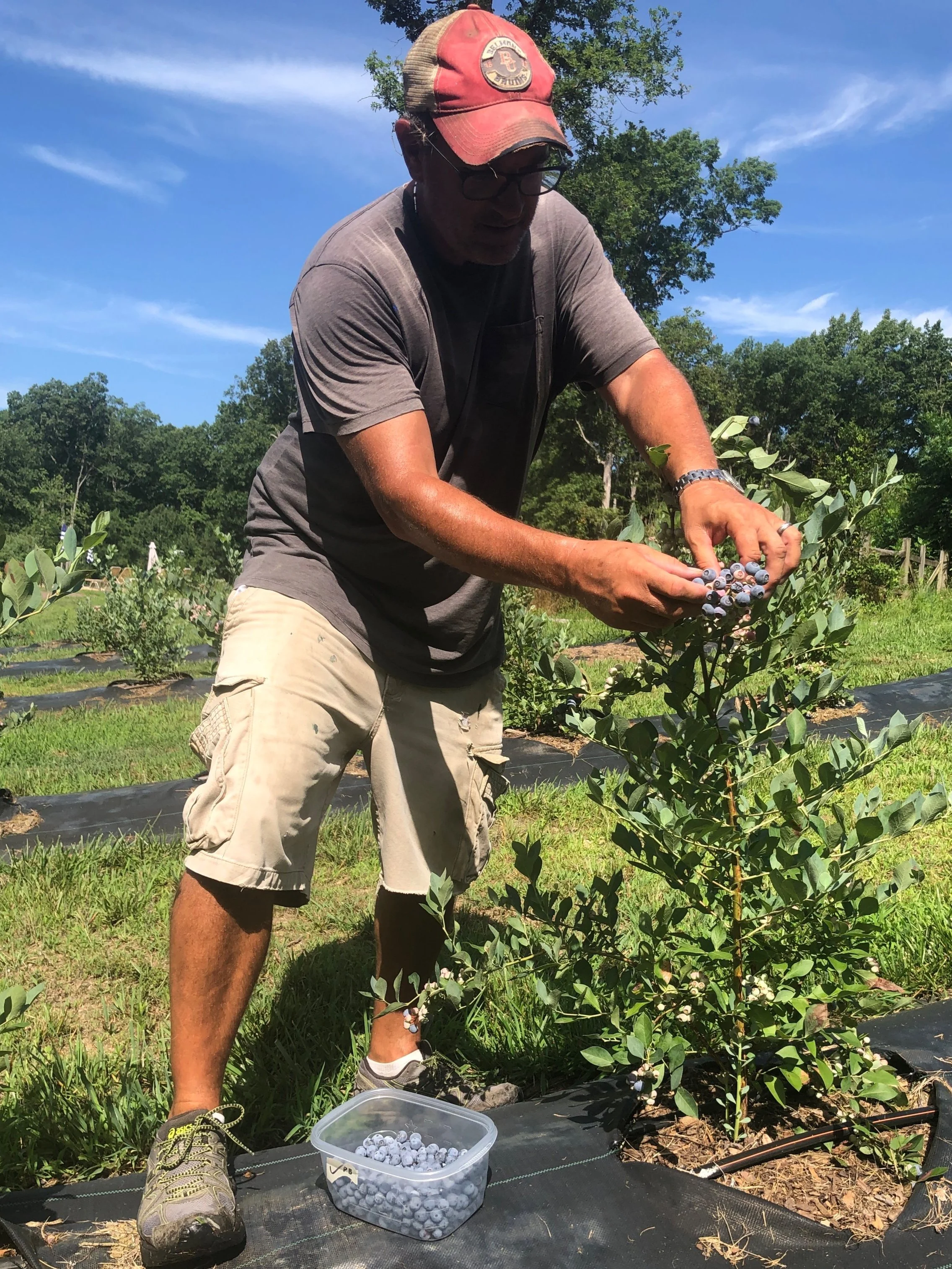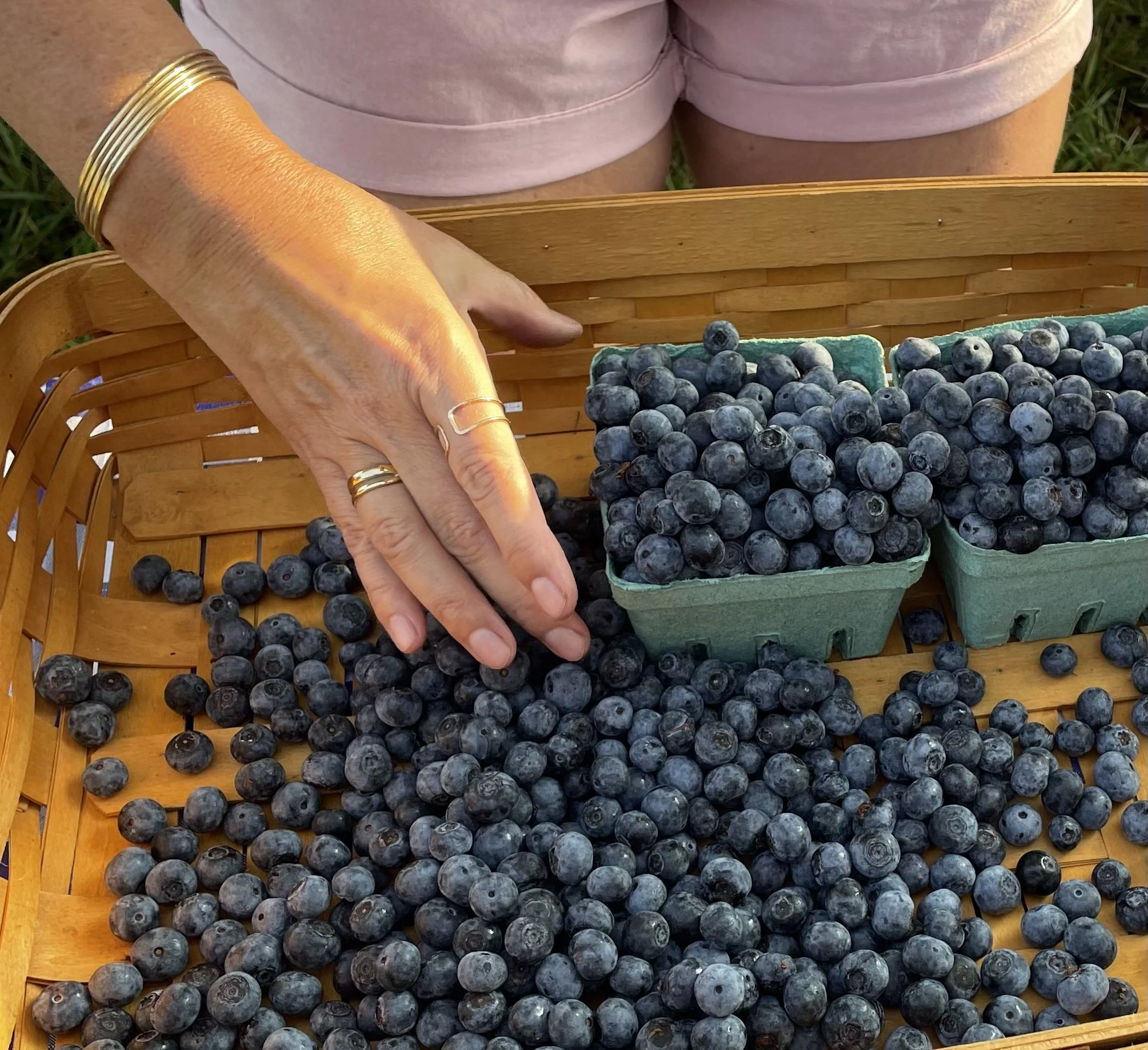-

Jack Murphy
-

Erin & Jack
-

Rob Mark
from bold choices to sweet rewards…
Our farming journey grew from a desire to provide our son, Jack, with the best opportunities as he approached adulthood. Almost 10 years ago we made the bold move from northern New Jersey to beautiful Hanover County with dreams of starting a farm for Jack and his peers to enjoy the wonders of farming.
Currently, we have planted almost 2,000 blueberry bushes. We also grow herbs, vegetables, and flowers. Our free-range hens contribute their eggs to all of our baking (we have quite a fan-group for our blueberry muffins!) Our most recent addition are fiber animals- angora goats for mohair fiber and angora rabbits for angora fiber. Our sweet guardian dog, Lola, keeps everyone safe (and gives the best smiles!)
We look forward to meeting you and appreciate your support!
As seen in Richmond Family Magazine
Hanover Family Farm Serving a Larger Purpose
By JOAN TUPPONCEJuly 15, 2024
A small farm with a big purpose. That’s what you’ll find when you visit Honeysuckle Farm in Hanover.
“That is who we are,” says Erin Murphy, who owns the farm with her husband Rob Mark. “We have created a business model for our family [Emma Murphy, 28, a doctor of occupational therapy, and Jack Murphy, 26].”
The family moved from New Jersey to Hanover after searching for a farm property. “We saw the town of Ashland, and we loved the Hanover schools,” says Erin who is a reading teacher at Patrick Henry High School in Hanover. “They had a really good autism program.”
That program meant a lot to the family because Erin’s son, Jack, has autism. He has limited verbal abilities and is unable to be independent in any aspect of his life.
“We started the farm for Jack and others of all abilities to have an opportunity for employment and job sampling,” Erin says. “We love being outside, and Jack loves being outside.”
As fate would have it, the family discovered they had blueberries growing naturally on the property. “We knew the soil was good for blueberries. We refer to the blueberries as Pop Billingsley blueberries. We named it after the family that built this home. We are still close to Pop’s son. He told us he knows how happy his father would be with what we have planted here,” Erin says.
Honeysuckle Farm and Blueberry Business in Hanover
Erin and her husband wanted to add more blueberry plants so they had the land cleared and built beds by hand. They planted their first 600 plants two weeks before COVID hit.
“That closed things down,” Erin says, adding that working the blueberries was a great way to keep their son engaged when opportunities to socialize had dwindled.
When they realized they couldn’t fit all of their blueberries in the refrigerator, they carried a table, tablecloth, and umbrella to the roadside and began selling blueberries. The family also started selling blueberries at the Ashland Farmer’s Market during blueberry season.
“Our neighbors in the community are so supportive of what we are doing. Everybody loved the product,” says Erin. “We pick them when they are ripe, one at a time. They are all natural, no chemicals used.”
Thanks to the strong sales of the blueberries, Erin decided to start making blueberry muffins to sell. “They sold out in an hour,” she says. “Then, we became bakers. We came up with our own recipe for muffins.”
The family bought a vintage camper and has converted it into a “little shop where we can sell fresh berries, blueberry muffins, and bottled water. We are going to get a coffee machine,” says Erin.
The camper is located at the roadside stand on 13121 Cedar Lane. It even has an area where you can sit and eat the muffins you purchase. “We plan on doing baked goods all year round,” Erin says, adding she hopes to add seasonal muffins to the menu.
Jack serves as a baker’s assistant helping line up containers and measuring cups and spoons. “He knows where to put the items. He’s good at memorizing the process. He’s best at routines that are predictable. He love putting the stickers on the bottom of the muffin,” Erin says about her son.
Jacks works at the roadside stand and is always with his mom at the farmer’s market every Saturday. His verbal skills lacking, his mom serves as his prompt to say here’s your change to customers and good morning and goodbye, simple exchanges that always bring a smile.
He also works at the roadside camper, going in and checking for payment when someone leaves — people pay for their items by putting their money in a jar.
In addition to blueberries, the farm has also added Angora rabbits, chickens, and Angora goats for mohair. “I knit, so I am going to make yarn from the mohair,” Erin says. “We also are growing gourds so the kids can put a hole in them, paint them, and make birdhouses out of them. We are trying to come up with things that Jack and the kids can do.”
The kids Erin is talking about are Jack’s peers from special needs families in the community. “They do a little bit of everything,” Erin says. “That includes animal care or the rabbits, chickens, and goats, getting fresh water and hay and collecting eggs. They also help with the blueberries in the summer.”
In terms of planting things, “we are not risk takers. We have five different varieties of blueberries, and we have other vegetables,” says Erin, noting her husband has been expanding the garden. “We are trying to do a grant for a greenhouse so the kids could work in the greenhouse through the winter.”
The family is also adding a larger baking kitchen to the house so multiple people can come and bake. “We might make breads, muffins, and chocolate chip cookies,” Erin says. “The kids will help us with the baking.”
Helping Kids with Disabilities
Transitional students – students who have an individualized education program (IEP) in the school system and are transitioning from school to the workforce – from Hanover come out to the farm to work in various jobs every week during the school year.
“They need to be exposed to as many different work opportunities as possible. The work with the teachers to see what jobs they like the most,” Erin says. “They are all high school students and they come every Wednesday.”
The family provides an overview of the farm when they first meet with the students. The teacher helps guide the students to different tasks, which allows the teacher to see what they like or enjoy.
“Some kids want to bake, some want to pic,k and some just come and watch. We create whatever job opportunity they want to do,” Erin says. “Our goal is to have a work environment and space for Jack and his peers to work and socialize.”
The students are operating in an outdoor farm and animal environment to see if they enjoy being outside. “We have purchased a workshop so they can do woodwork,” Erin says.
Jack also works alongside his stepfather to experience all farm-related jobs “so he can work as independently as he is able to based on the task,” Erin says
The family hopes to start a farm-to-table outdoor dinner served family style and Jack and his peers will help cook the meal and serve it, providing an opportunity for them “to practice cooking, serving and communication skills, all the skills they can use going out in the community,” Erin says.
Erin and Rob have created a family farm to help young people with autism and developmental disabilities connect with the environment and learn life skills.
Jack has made friends along the way. “People are drawn to Jack,” Erin says. “There is something magical about him.”
The family wanted to create — and has been successful in doing so — something that can continue when “we are no longer here,” says Erin. “This is a work of love for our family.”

